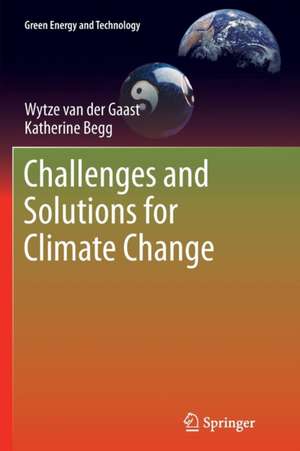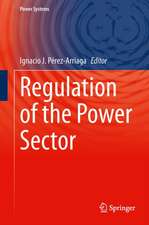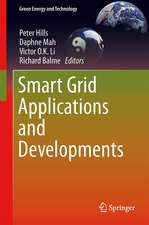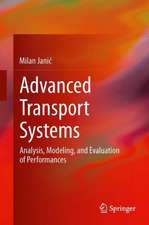Challenges and Solutions for Climate Change: Green Energy and Technology
Autor Wytze van der Gaast, Katherine Beggen Limba Engleză Paperback – 2 ian 2013
As a result, climate change and sustainable development have increasingly become interlinked. A changing climate makes achieving Millennium Development Goals more difficult and expensive, so there is every reason to achieve development goals with low greenhouse gas emissions. This leads to the following five challenges discussed by Challenges and Solutions for Climate Change:
1. To place climate negotiations in the wider context of sustainability, equity and social change so that development benefits can be maximised at the same time as decreasing greenhouse gas emissions.
2. To select technologies or measures for climate change mitigation and adaptation based on countries’ sustainable development and climate goals.
3. To create low greenhouse gas emission and climate resilient strategies and action plans in order to accelerate innovation needed for achieving sustainable development and climate goals on the scale and timescale required within countries.
4. To rationalize the current directions in international climate policy making in order to provide coherent and efficient support to developing countries in devising and implementing strategies and action plans for low emission technology transfers to deliver climate and sustainable development goals.
5. To facilitate development of an international framework forfinancial resources in order to support technology development and transfer, improve enabling environments for innovation, address equity issues such as poor people’s energy access, and make implementation of activities possible at the desired scale within the country.
The solutions presented in Challenges and Solutions for Climate Change show how ambitious measures can be undertaken which are fully in line with domestic interests, both in developing and in developed countries, and how these measures can be supported through the international mechanisms.
| Toate formatele și edițiile | Preț | Express |
|---|---|---|
| Paperback (1) | 634.49 lei 6-8 săpt. | |
| SPRINGER LONDON – 2 ian 2013 | 634.49 lei 6-8 săpt. | |
| Hardback (1) | 639.25 lei 6-8 săpt. | |
| SPRINGER LONDON – 23 mai 2012 | 639.25 lei 6-8 săpt. |
Din seria Green Energy and Technology
- 18%
 Preț: 943.43 lei
Preț: 943.43 lei - 20%
 Preț: 629.52 lei
Preț: 629.52 lei - 18%
 Preț: 1124.92 lei
Preț: 1124.92 lei - 18%
 Preț: 947.35 lei
Preț: 947.35 lei - 15%
 Preț: 655.92 lei
Preț: 655.92 lei - 18%
 Preț: 957.62 lei
Preț: 957.62 lei - 18%
 Preț: 789.52 lei
Preț: 789.52 lei - 17%
 Preț: 464.56 lei
Preț: 464.56 lei - 15%
 Preț: 645.79 lei
Preț: 645.79 lei - 18%
 Preț: 903.93 lei
Preț: 903.93 lei - 24%
 Preț: 1322.09 lei
Preț: 1322.09 lei - 18%
 Preț: 890.54 lei
Preț: 890.54 lei - 18%
 Preț: 1115.46 lei
Preț: 1115.46 lei - 18%
 Preț: 1117.03 lei
Preț: 1117.03 lei - 18%
 Preț: 949.73 lei
Preț: 949.73 lei - 18%
 Preț: 892.11 lei
Preț: 892.11 lei - 15%
 Preț: 648.24 lei
Preț: 648.24 lei - 18%
 Preț: 997.09 lei
Preț: 997.09 lei - 15%
 Preț: 579.81 lei
Preț: 579.81 lei - 18%
 Preț: 1123.15 lei
Preț: 1123.15 lei - 18%
 Preț: 961.41 lei
Preț: 961.41 lei - 17%
 Preț: 490.23 lei
Preț: 490.23 lei - 18%
 Preț: 904.60 lei
Preț: 904.60 lei - 15%
 Preț: 643.34 lei
Preț: 643.34 lei -
 Preț: 287.91 lei
Preț: 287.91 lei - 24%
 Preț: 634.05 lei
Preț: 634.05 lei -
 Preț: 379.40 lei
Preț: 379.40 lei - 18%
 Preț: 783.20 lei
Preț: 783.20 lei - 18%
 Preț: 1394.84 lei
Preț: 1394.84 lei - 18%
 Preț: 1691.57 lei
Preț: 1691.57 lei - 18%
 Preț: 1112.48 lei
Preț: 1112.48 lei - 15%
 Preț: 592.61 lei
Preț: 592.61 lei - 18%
 Preț: 952.09 lei
Preț: 952.09 lei - 18%
 Preț: 944.19 lei
Preț: 944.19 lei - 18%
 Preț: 891.33 lei
Preț: 891.33 lei - 18%
 Preț: 1252.44 lei
Preț: 1252.44 lei - 18%
 Preț: 789.52 lei
Preț: 789.52 lei - 20%
 Preț: 566.30 lei
Preț: 566.30 lei - 18%
 Preț: 1113.71 lei
Preț: 1113.71 lei - 18%
 Preț: 1114.24 lei
Preț: 1114.24 lei - 24%
 Preț: 590.60 lei
Preț: 590.60 lei - 20%
 Preț: 567.50 lei
Preț: 567.50 lei - 24%
 Preț: 907.50 lei
Preț: 907.50 lei - 18%
 Preț: 952.89 lei
Preț: 952.89 lei - 18%
 Preț: 952.89 lei
Preț: 952.89 lei - 18%
 Preț: 950.52 lei
Preț: 950.52 lei
Preț: 634.49 lei
Preț vechi: 746.47 lei
-15% Nou
Puncte Express: 952
Preț estimativ în valută:
121.45€ • 131.96$ • 102.08£
121.45€ • 131.96$ • 102.08£
Carte tipărită la comandă
Livrare economică 21 aprilie-05 mai
Preluare comenzi: 021 569.72.76
Specificații
ISBN-13: 9781447126027
ISBN-10: 1447126025
Pagini: 176
Ilustrații: XIV, 162 p.
Dimensiuni: 155 x 235 x 9 mm
Greutate: 0.25 kg
Ediția:2012
Editura: SPRINGER LONDON
Colecția Springer
Seria Green Energy and Technology
Locul publicării:London, United Kingdom
ISBN-10: 1447126025
Pagini: 176
Ilustrații: XIV, 162 p.
Dimensiuni: 155 x 235 x 9 mm
Greutate: 0.25 kg
Ediția:2012
Editura: SPRINGER LONDON
Colecția Springer
Seria Green Energy and Technology
Locul publicării:London, United Kingdom
Public țintă
ResearchCuprins
Technology Transfer in International Energy and Climate Policy.- Assessing Countries’ Energy Service Needs and Technologies.- Energy Service and Technology Needs Assessments in Case Study Countries.- Technology Transfer Aspects: Mapping Markets for Technologies.- Low-Carbon Technology Market Mapping in the Case-Study Countries.- Accelerating Technology Development, Deployment and Diffusion.
Notă biografică
Wytze van der Gaast has worked on climate policy development especially on greenhouse gas accounting issues and technology transfer. He participated in several capacity building projects in developing countries on project-based emissions trading under the Kyoto Protocol. He was coordinator of the EU-funded project Promoting Sustainable Energy Technology Transfers through the CDM: Converting from a Theoretical Concept to Practical Action (ENTTRANS). Together with Dr Begg, he worked for the UN Development Programme on updating the Handbook for Conducting Technology Needs Assessments for Climate Change. He has also been an advisor to the UN Environment Programme and UN Framework Convention on Climate Change. He is on the UNFCCC Roster of Experts.
Katie Begg was a principal lecturer at the Institute of Energy and sustainable development (IESD) at De Montfort University before moving to Edinburgh University as a senior research fellow. She has worked on energy and climate policy, particularly the Clean Development Mechanism, technology transfer and development and decision analysis for a number of years. She was a collaborator in the ENTTRANS project described above on technology transfer and co-author on the Technology Needs Assessment handbook for UNDP, an official reviewer for the IPCC TAR and was on the UNFCCC Roster of Experts.
Katie Begg was a principal lecturer at the Institute of Energy and sustainable development (IESD) at De Montfort University before moving to Edinburgh University as a senior research fellow. She has worked on energy and climate policy, particularly the Clean Development Mechanism, technology transfer and development and decision analysis for a number of years. She was a collaborator in the ENTTRANS project described above on technology transfer and co-author on the Technology Needs Assessment handbook for UNDP, an official reviewer for the IPCC TAR and was on the UNFCCC Roster of Experts.
Textul de pe ultima copertă
The latest scientific knowledge on climate change indicates that higher greenhouse gas concentrations in the atmosphere through unchecked emissions will provoke severe climate change and ocean acidification threatening environmental structures on which humanity relies. Climate change therefore poses major socio-economic, technical and environmental challenges which will have serious impacts on countries’ pathways towards sustainable development.
As a result, climate change and sustainable development have increasingly become interlinked. A changing climate makes achieving Millennium Development Goals more difficult and expensive, so there is every reason to achieve development goals with low greenhouse gas emissions. This leads to the following five challenges discussed by Challenges and Solutions for Climate Change:
As a result, climate change and sustainable development have increasingly become interlinked. A changing climate makes achieving Millennium Development Goals more difficult and expensive, so there is every reason to achieve development goals with low greenhouse gas emissions. This leads to the following five challenges discussed by Challenges and Solutions for Climate Change:
- To place climate negotiations in the wider context of sustainability, equity and social change so that development benefits can be maximised at the same time as decreasing greenhouse gas emissions.
- To select technologies or measures for climate change mitigation and adaptation based on countries’ sustainable development and climate goals.
- To create low greenhouse gas emission and climate resilient strategies and action plans in order to accelerate innovation for sustainable development and climate goals on the scale and timescale required within countries.
- To rationalize the current directions in international climate policy making in order to provide coherent and efficient support to developing countries in devising and implementing strategies and action plans for low emission technology transfers to deliver climate and sustainable development goals.
- To facilitate development of an international framework for financial resources in order to support technology development and transfer, improve enabling environments for innovation, address equity issues such as poor people’s energyaccess, and make implementation of activities possible at the desired scale within the country.
Caracteristici
Addresses the implementation of green-energy technology from a technological to a national level. Features illustrative case studies of developing countries. Written by experts. Includes supplementary material: sn.pub/extras Includes supplementary material: sn.pub/extras














